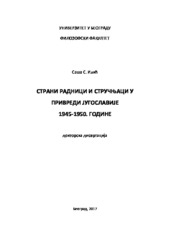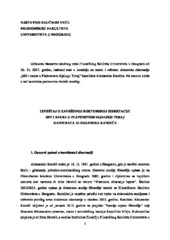Приказ основних података о дисертацији
Страни радници и стручњаци у привреди Југославије: 1945-1950
Foreign workers and labour experts in the Yugoslav economy: 1945-1950
| dc.contributor.advisor | Stojanović, Dubravka | |
| dc.contributor.other | Ristović, Milan | |
| dc.contributor.other | Aleksić, Vesna | |
| dc.creator | Ilić, Saša S. | |
| dc.date.accessioned | 2018-04-23T09:28:42Z | |
| dc.date.available | 2018-04-23T09:28:42Z | |
| dc.date.available | 2020-07-03T10:05:24Z | |
| dc.date.issued | 2018-02-12 | |
| dc.identifier.uri | https://nardus.mpn.gov.rs/handle/123456789/9348 | |
| dc.identifier.uri | http://eteze.bg.ac.rs/application/showtheses?thesesId=5690 | |
| dc.identifier.uri | https://fedorabg.bg.ac.rs/fedora/get/o:17416/bdef:Content/download | |
| dc.identifier.uri | http://vbs.rs/scripts/cobiss?command=DISPLAY&base=70036&RID=529281175 | |
| dc.description.abstract | Пре Другог светског рата Југославија је била аграрна, слабо индустријализована и немодерна земља. На лошу основу надовезале су се последице рата. Индустрија и саобраћај били су разорени, а људске жртве огромне. Победничка комунистичка идеологија као примарни циљ развоја друштва (и средства за очување власти), сагласно моделу опробаном раније у Совјетском Савезу, прокламује интензивну индустријализацију и електрификацију. Међутим, делатности на модернизацији привреде нису биле могуће без стручног кадра, кога није било довољно. Спас се очекивао од СССР, али иза великих обећања нису стајала адекватна дела, па је у југословенском развоју учествовао тек мали број (претерано плаћених) совјетских стручњака. Остала су два извора стране стручне радне снаге које ће моделатори југословенске привредне политике обилато користити. Први извор био је у земљи – бројни ратни заробљеници којима ће се у замену за уговор о раду понудити слобода, што су хиљаде њих прихватили. Други се налазио у суседним и оближњим земљама у којима је рат створио незапосленост – највише Немачкој, али и Аустрији, Чехословачкој, Мађарској, Италији и Бугарској. Ти стручњаци биће тражени, или ће сами нудити услуге, и хиљаде њих биће на више година ангажовано у предузећима Југославије. Резултати које су оставили у привреди, посебно електропривреди, хемијској, машинској, аутомобилској и радио-индустрији били су импресивни. Истраживање теме обављено је на обимној архивској грађи, првенствено фондова Архива Југославије, а оквир историјске појаве и епохе на основу бројне домаће и стране публиковане грађе, литературе и штампе. При обради теме коришћен је класичан историографски метод, допуњен техникама демографије, статистике, социологије, психологије, економске и друштвене историје, изучавања свакодневице и приватности. | sr |
| dc.description.abstract | Before the World War Two, Yugoslavia was an agrarian, poorly industrialized and non-modernized country. The consequences of the war added up to the bad foundation. The industrial and traffic infrastructures were destroyed and human casualties remained huge. The victorious communist ideology proclaimed intense industrialization and electrification as the primary goal for the development of society (and the means for preserving power) in accordance with the model, which had been tried out earlier in the Soviet Union. However, the activities on the modernization of the economy were not possible without professional personnel, which was shortage of. The salvation was expected from the USSR, but the big promises were not followed by adequate deeds, so only a small number of (overpaid) Soviet experts took part in the Yugoslav development. There remained two sources of foreign professional labour force that the modelers of Yugoslav economic policy would use abundantly. The first source was in the country - numerous prisoners of war who, in exchange for a labor contract were offered freedom, which was accepted by thousands of them. The other was located in neighboring and nearby countries where the war created unemployment - mostly Germany, but also Austria, Czechoslovakia, Hungary, Italy and Bulgaria. Those experts were searched for, but also they offered themselves to provide services, and thousands of them were hired in companies in Yugoslavia on a few years and longer. The results they held up in the economy, especially the electric power industry, the chemical, mechanical, automotive and radio industries were impressive. The research of the topic was carried out on extensive archival material, primarily the funds of the Archives of Yugoslavia, and the framework of the historical phenomenon and epoch are based on numerous domestic and foreign published sources, literature and press. In the management of the topic, a classic historiographical method was used, complemented by techniques of demography, statistics, sociology, psychology, economic and social history, the study of everyday life and privacy. | en |
| dc.format | application/pdf | |
| dc.language | sr | |
| dc.publisher | Универзитет у Београду, Филозофски факултет | sr |
| dc.rights | openAccess | en |
| dc.rights.uri | https://creativecommons.org/licenses/by-nc-sa/4.0/ | |
| dc.source | Универзитет у Београду | sr |
| dc.subject | страни стручњаци | sr |
| dc.subject | foreign labour experts | en |
| dc.subject | радна снага | sr |
| dc.subject | радни односи | sr |
| dc.subject | привреда | sr |
| dc.subject | свакодневица | sr |
| dc.subject | Југославија | sr |
| dc.subject | Европа | sr |
| dc.subject | Немачка | sr |
| dc.subject | СССР | sr |
| dc.subject | labour force | en |
| dc.subject | labour relations | en |
| dc.subject | economy | en |
| dc.subject | everyday life | en |
| dc.subject | Yugoslavia | en |
| dc.subject | Europe | en |
| dc.subject | Germany | en |
| dc.subject | USSR | en |
| dc.title | Страни радници и стручњаци у привреди Југославије: 1945-1950 | sr |
| dc.title.alternative | Foreign workers and labour experts in the Yugoslav economy: 1945-1950 | en |
| dc.type | doctoralThesis | en |
| dc.rights.license | BY-NC-SA | |
| dcterms.abstract | Стојановић, Дубравка; Aлексић, Весна; Ристовић, Милан; Илић, Саша С.; Strani radnici i stručnjaci u privredi Jugoslavije: 1945-1950; | |
| dc.identifier.fulltext | https://nardus.mpn.gov.rs/bitstream/id/27844/Disertacija.pdf | |
| dc.identifier.fulltext | https://nardus.mpn.gov.rs/bitstream/id/27845/IzvestajKomisije15997.pdf | |
| dc.identifier.fulltext | http://nardus.mpn.gov.rs/bitstream/id/27844/Disertacija.pdf | |
| dc.identifier.fulltext | http://nardus.mpn.gov.rs/bitstream/id/27845/IzvestajKomisije15997.pdf | |
| dc.identifier.rcub | https://hdl.handle.net/21.15107/rcub_nardus_9348 |



